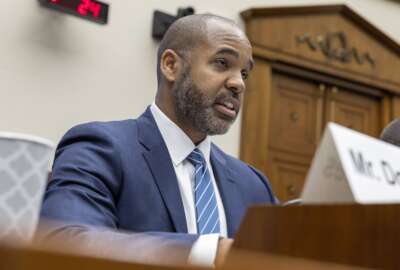A new national park for a long-ago American heroine?
"Our primary purpose is to make sure that more people learn about this incredible woman and her impact on American society," said Giovanna Lockhart.
Although her name is on the Labor Department headquarters, Frances Perkins is not well known nearly 60 years since her death. Yet the long-serving secretary of Labor left an enormous legacy for the U.S. public and on the government itself. Now the keeper of Perkins’ legacy is seeking to have her homestead in Maine made into a national park. For details, the Executive Director of the Frances Perkins Center, Giovanna Gray Lockhart, joined the Federal Drive with Tom Temin.
Interview transcript:
Giovanna Lockhart So the Frances Perkins Center’s mission is to educate and inspire current and future generations on Frances Perkins’ belief that government should provide the best possible life for all its people. And we are based in Newcastle, Maine, in which is about an hour outside of Portland on the coast, and we are actually at the homestead, the Perkins family homestead, which is a 57 acre beautiful property with an 1837 brick house that Frances Perkins’ grandmother lived in. And actually the property ownership dates all the way back to the 1750s to the original Perkins ancestors. So we run this national organization out of Maine. But our primary purpose is to make sure that more people learn about this incredible woman and her impact on American society.
Eric White You talk about wanting to continue her message of trying to push folks to get involved with government and having good government initiatives to take place. How do you all go about that, other than educating them about Frances Perkins herself? If you’re not a policy wonk or an American history buff like myself, you may not even know who she was. But do you find it just spreading awareness about the woman herself kind of does the job, or are there other avenues that you all take?
Giovanna Lockhart Well, so we’re a 5O1C3 nonprofit organization. We hold various programing events and educational events. We encourage scholarship of historians. There’s very little written, actually, about Frances Perkins. She was someone who was very private during her career, didn’t talk to reporters very often and didn’t even write a biography when she received an advance to write a book shortly after the end of the [Franklin D.] Roosevelt administration. She ended up writing the book about him. It was called The Roosevelt I Knew, and she pretty much wrote herself out of the story, which is not uncommon for women at this level of leadership at that at that time, and certainly today, to be honest. But what we’re trying to do is shine a light on her work and the unfinished business of the New Deal and bring her memory and her philosophy of government into the 21st century. She certainly deserves to be an icon and I think is someone who would really inspire anyone who was considering a role in public service. Our organization is relatively young and we’re just starting out, but we do have this incredible property that we want more people to visit. And that’s why we’ve launched this campaign for a national monument.
Eric White Yes. Thank you for the transition. I wanted to touch on that. You all are looking to making her home a national monument, as you said. What would that do for your organization and the memory of Frances Perkins herself to be solidified – she gave herself to the U.S. government and now she’ll be giving her memory to the U.S. government?
Giovanna Lockhart Yes, absolutely. It’s so powerful to learn about history in the place where history was made. I mean, we know that the National Park Service is the gold standard in in preserving not only land and beautiful natural spaces, but also in historic preservation and historic interpretation. And that’s something that we we want to do in order to elevate Frances Perkins’ story, by preserving the place that she shaped her character, that was her one true home. The place that the down to earth common sense values of Maine became the defining features of her leadership style. And her approach to government, I think, would be so empowering and inspirational, particularly to young people. And so by signing the proclamation and designating this place a national monument, President Biden would be ensuring that it would be preserved in perpetuity and that millions of Americans would be able to learn more about this incredible woman.
Eric White We’re speaking with Giovanna Gray Lockhart. She’s the executive director of the Frances Perkins Center. And we’ve been kind of talking around her and her history. And we’re kind of assuming, I guess, that a lot of folks would know who she is. But let’s get into the woman herself that this is all about. We do a lot of coverage of public employee unions because that’s who a lot of federal government employees are, are members of those unions. That probably wouldn’t have happened without her. If you could give us a little bit of what is the biggest takeaway from her story that you find fascinating and what she means towards the rights that current workers in or out of the government now today enjoy because of her.
Giovanna Lockhart She was the first woman to hold a cabinet position in the United States. So that in and of itself is an amazing achievement in 1933. But that’s not what makes her special and not what makes her so unique. She was FDR’s closest and most highly regarded advisor, and she was called upon because of her deep knowledge and experience both in understanding how economic policy affects workers, but she was also a trained social worker, so she knew up close and personal how workplace regulations and wage and all of those fair labor standards, how they actually impacted people in their daily lives. You have to remember that at this time, the prevailing notion was that if you were poor living in poverty, it was through your own fault, in your own doing. And many, many people were stuck in poverty because of the wages they were earning and the standards and conditions that they were working under and the exploitation that was happening in factories, mills across this country. So what she did upon FDR’s election was really focus in on her key priorities, something that she had done as labor commissioner in New York state. But creating the 40 hour workweek, establishing unemployment insurance, banning child labor, which was common practice at this time, setting up the minimum wage so people could actually afford to live. And we all know that with increased wages, it helps the economy because there’s increased consumption. And lastly, what she defined as her most impactful achievement, it was the Social Security Act. Now, I’ve just listed a bunch of policies that were the cornerstone of American society. But you asked me about the labor unions. I mean, she created the Fair Labor Standards Act and the National Labor Relations Board. Those were her other two sort of major contributions to workers’ rights in this country.
Eric White It’s kind of a cliche that back then, any trailblazing women, you get the phrase of well-behaved women rarely make it. But it seemed as if she was able to do it while also maintaining a softer approach. She wasn’t necessarily coming through with an ax and chopping down speakeasies or anything like that. She was really trying to work with people, even though she was facing obstacles at every turn. Is that something that you have found as well in studying her life?
Giovanna Lockhart Absolutely. I mean, she really was someone who had a big heart and a lot of empathy. And I think that and a real sense that people deserve a good life. And I think that is very, if you look around that cabinet table in 1933 and you see this one woman and the rest are men who certainly, many of them deserve to be there and had wonderful, great, important experience. But many also were born into privilege, as the president himself. She comes from a farming family from rural Maine and understood that you have to, in order to better your life, you are going to need to work hard. But she saw people working hard and not being able to get themselves out of poverty. And I think that women bring such a unique perspective to the table. And you had asked me in the in the beginning of this segment about my background. I worked in the United States Senate for four years for Sen. Kirsten Gillibrand (D-N.Y.). And one of the things I learned very early on in my career is that when women’s voices are heard and they have a seat at the table, there are better outcomes for everyone.
Eric White And where can folks learn more about this campaign and Frances Perkins overall, what’s the avenue to do that?
Giovanna Lockhart They can visit our website. We have a lot of information there about life, her accomplishments. And we also have a petition that we’re asking, urging people to sign a virtual petition where we are collecting names to send to the President in support of our national monument designation.
Copyright © 2025 Federal News Network. All rights reserved. This website is not intended for users located within the European Economic Area.
Tom Temin is host of the Federal Drive and has been providing insight on federal technology and management issues for more than 30 years.
Follow @tteminWFED






